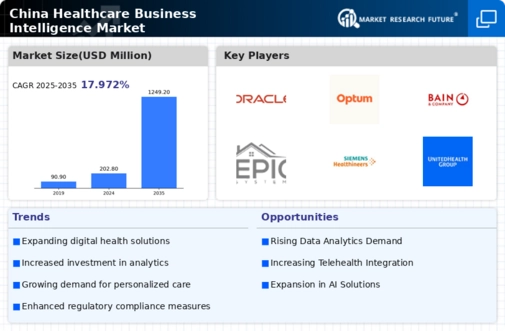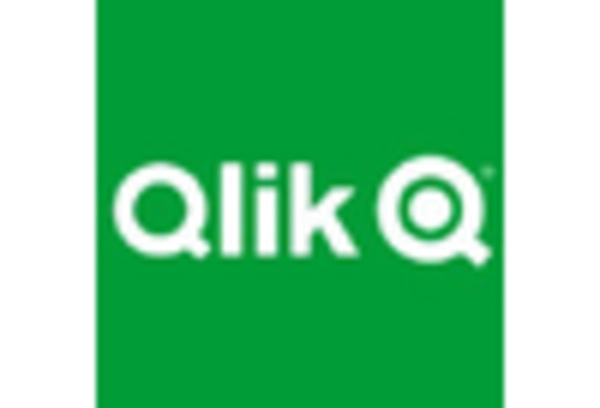Emergence of Telehealth Services
The emergence of telehealth services in China is reshaping the healthcare landscape and driving the healthcare business-intelligence market. As telehealth becomes more prevalent, healthcare providers are increasingly relying on data analytics to monitor patient outcomes and optimize virtual care delivery. Business-intelligence solutions play a vital role in analyzing telehealth data, enabling providers to assess the effectiveness of remote consultations and treatments. This trend is likely to accelerate as more patients seek convenient healthcare options, leading to a projected increase in telehealth adoption by 30% over the next few years. The integration of business-intelligence tools within telehealth services is expected to enhance patient engagement and satisfaction, thereby propelling the growth of the healthcare business-intelligence market in China.
Increasing Focus on Patient-Centric Care
The shift towards patient-centric care in China is emerging as a pivotal driver for the healthcare business-intelligence market. Healthcare providers are increasingly recognizing the importance of tailoring services to meet individual patient needs, which necessitates the use of advanced analytics. Business-intelligence solutions enable healthcare organizations to analyze patient data, identify trends, and personalize treatment plans. This focus on patient outcomes is likely to drive investments in business-intelligence tools that enhance the understanding of patient preferences and behaviors. As a result, the healthcare business-intelligence market is expected to witness robust growth, with organizations seeking to leverage data analytics to improve patient satisfaction and engagement. The emphasis on patient-centric approaches aligns with broader healthcare reforms in China, further propelling the demand for business-intelligence solutions.
Regulatory Support for Health IT Initiatives
In China, the government is actively promoting health information technology (IT) initiatives, which significantly impacts the healthcare business-intelligence market. Regulatory frameworks are being established to encourage the adoption of digital health solutions, including business-intelligence tools. The Chinese government has allocated substantial funding to support the development of health IT infrastructure, aiming to improve healthcare quality and accessibility. This regulatory support is expected to enhance the integration of business-intelligence solutions within healthcare organizations, facilitating better data management and analytics capabilities. As a result, healthcare providers are likely to adopt these technologies more readily, contributing to the overall growth of the healthcare business-intelligence market. The alignment of government policies with industry needs creates a conducive environment for innovation and investment in health IT.
Growing Demand for Data-Driven Decision Making
The healthcare business-intelligence market in China is experiencing a notable surge in demand for data-driven decision-making processes. As healthcare providers increasingly recognize the value of data analytics, they are investing in advanced business-intelligence solutions to enhance operational efficiency and patient outcomes. Reports indicate that the market is projected to grow at a CAGR of approximately 15% over the next five years. This growth is driven by the need for real-time insights into patient care, resource allocation, and treatment effectiveness. Consequently, healthcare organizations are prioritizing the implementation of business-intelligence tools that facilitate data analysis and visualization, thereby enabling informed decision-making. The emphasis on data-driven strategies is likely to reshape the landscape of healthcare delivery in China, making it a critical driver for the healthcare business-intelligence market.
Rising Investment in Healthcare Infrastructure
China's ongoing investment in healthcare infrastructure is significantly influencing the healthcare business-intelligence market. The government has committed to enhancing healthcare facilities and services, which includes the integration of advanced technologies. As hospitals and clinics upgrade their infrastructure, there is a growing need for business-intelligence solutions to manage and analyze the vast amounts of data generated. This investment is projected to reach approximately $200 billion by 2026, creating a favorable environment for the adoption of business-intelligence tools. Healthcare organizations are likely to seek solutions that can streamline operations, improve patient care, and optimize resource utilization. Consequently, the rising investment in healthcare infrastructure serves as a crucial driver for the healthcare business-intelligence market, fostering innovation and technological advancement.
















